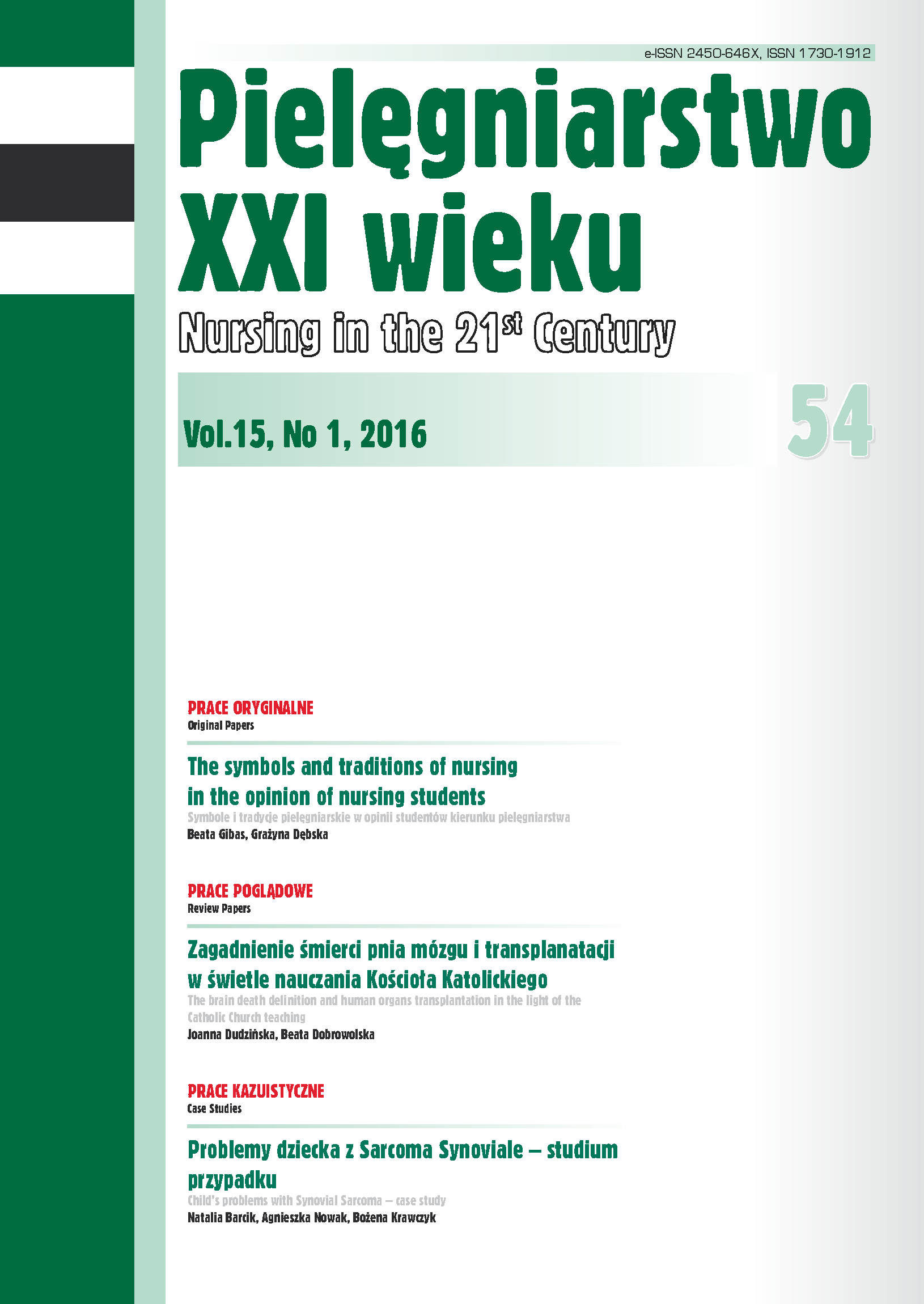Ocena rzetelności i trafności autorskiegokwestionariusza do badania wiedzy i postawwobec rozszerzenia uprawnień zawodowychpielęgniarek i położnych w zakresiesamodzielnego ordynowania niektórych leków,wystawiania recept oraz kierowania na wybranebadania diagnostyczne – doniesienie wstępne
DOI:
https://doi.org/10.1515/pielxxiw-2016-0005Słowa kluczowe:
rzetelność, trafność, autorski kwestionariusz, wiedza, postawy, studenci, pielęgniarstwo, rozszerzenie uprawnień zawodowychAbstrakt
OCENA RZETELNOŚCI I TRAFNOŚCI AUTORSKIEGO KWESTIONARIUSZA DO BADANIA WIEDZY I POSTAW WOBEC ROZSZERZENIA UPRAWNIEŃ ZAWODOWYCH PIELĘGNIAREK I POŁOŻNYCH W ZAKRESIE SAMODZIELNEGO ORDYNOWANIA NIEKTÓRYCH LEKÓW, WYSTAWIANIA RECEPT ORAZ KIEROWANIA NA WYBRANE BADANIA DIAGNOSTYCZNE – DONIESIENIE WSTĘPNE
Cel pracy. Od 1.01.2016 r. pielęgniarki i położne (PiP) zyskają nowe uprawnienia zawodowe. Ocena rzetelności i trafności kwestionariusza do badania wiedzy i postaw wobec rozszerzenia uprawnień zawodowych PiP.
Materiał i metodyka. Badaniami objęto 42 studentów, którzy dobrowolne, anonimowo wypełnili autorski kwestionariusz, 11 pytań (wiedza), 32 stwierdzenia (postawy), skala Likerta. Łatwość oraz moc różnicująca pytań.
Wyniki. Współczynnik alfa Cronbacha (α>0,70). Ocena trafności metodą pośredniego szacowania trafności teoretycznej poprzez wyznaczenie wewnętrznej korelacji. Różnice: ANOVA Kruskala-Wallisa, chi2 Pearsona. STATISTICA 12.5, α=0,05. Łatwość 11 pytań: 0,52, moc różnicująca: 0,21. α-Cronbacha: 0,671. Dla 26 stwierdzeń tworzących podskalę I w analizie czynnikowej wyodrębniono dwa czynniki, z czego 11 pozycji utworzyło zgrupowanie (Ia), a dalsze 4 drugie zgrupowanie (Ib). Dla pozostałych 11 stwierdzeń z podskali I z analizy rotacji ładunków czynnikowych nie uzyskano jednoznacznego wyniku. Wyniki analizy czynnikowej wskazują, że struktura podskali II (6 pozycji) jest jednolita. Porównanie studentów w zakresie wiedzy nie wskazują różnic względem kierunku studiów (test Kruskala-Wallisa, H = 1,983; p = 0,371).
Wnioski. 1. Ocena rzetelności i trafności kwestionariusza wykazała, że jest właściwym narzędziem do badania postaw wobec rozszerzania kompetencji zawodowych PiP. 2. Ocena kwestionariusza wskazuje konieczność modyfikacji w obszarze pytań dotyczących wiedzy. 3. Badania powinny być kontynuowane w zróżnicowanej pod względem wykształcenia oraz miejsca i warunków zatrudnienia oraz doświadczenia zawodowego PiP.
Bibliografia
1. Mączyńska-Dilis A. Recepty - nowe obowiązki pielęgniarek i położnych. Analiza przypadków w pielęgniarstwie i położnictwie 2014; 1: 6-10.
2. Ustawa z dnia 15 lipca 2011 r. o zawodach pielęgniarki i położnej (Dz. U. Nr 174, poz. 1039, z późn. zm.).
3. Niemierko B. Pomiar wyników kształcenia. Warszawa: Wydawnictwo Szkolne i Pedagogiczne; 1999.
4. Niemierko B. Diagnostyka edukacyjna. Warszawa: Wydawnictwo Naukowe PWN; 2009.
5. Feldt LS. A test of hypothesis that Cronbachs alpha or Kuder-Richardson coefficent 20 is same for 2 tests. Psychometrika. 1969;34(3):363.
6. Cronbach LJ. Test validation. In: Thorndike RL, editor. Educational measurement. 2nd ed. Washington: American Council on Education; 1971.
7. Nunnally JC, Bernstein IH. Psychometric theory. 3 ed. New York: McGraw-Hill New York; 1967.
8. Jankowski K, Zajenkowski M. Metody szacowania rzetelności pomiaru testem. In: Fronczyk K, editor. Psychometria - podstawowe zagadnienia. Warszawa: Vizja Press & IT; 2009, s. 84-110.
9. Cronbach LJ, Meehl PE. Construct validity in psychological tests. Psychological bulletin. 1955;52(4):281.
10. Tarnowski A, Fronczyk K. Szacowanie trafności. In: Fronczyk K, editor. Psychometria - podstawowe zagadnienia. Warszawa: Vizja Press & IT; 2009. p. 140-60.
11. Zakrzewska M. Analiza czynnikowa w budowaniu i sprawdzaniu modeli psychologicznych. Poznań: Uniwersytet im. Adama Mickiewicza w Poznaniu; 1994.
12. Kaiser HF. The varimax criterion for analytic rotation in factor analysis. Psychometrika. 1958;23(3):187-200.
13. Fabrigar LR, Wegener DT, MacCallum RC, Strahan EJ. Evaluating the use of exploratory factor analysis in psychological research. Psychological methods. 1999;4(3):272.
14. Stanisz A. Przystępny kurs statystyki z zastosowaniem STATISTICA PL na przykładach medycznych: Tom 3. Analiza wielowymiarowa. Kraków: StatSoft Polska; 2007.
Opublikowane
Numer
Dział
Licencja
Prawa autorskie (c) 2016 Autorzy

Praca jest udostępniana na licencji Creative Commons Attribution-NonCommercial-NoDerivatives 3.0 Unported License.




